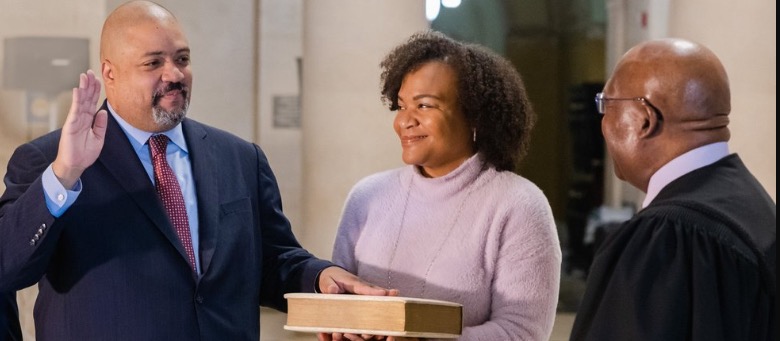Manhattan District Attorney Alvin Bragg led the investigation that resulted in the first felony conviction of a former United States President, Donald Trump. Bragg’s case centered on the hush money paid to Stormy Daniels, a porn actor who said she and Trump had sex in 2006. The trial involved charges that Trump falsified business records to cover up the payment to Daniels.
“While this defendant may be unlike any other in American history, we arrived at this trial and ultimately today at this verdict in the same manner as every other case that comes to the courtroom doors,” Bragg said during a press conference after the jury’s verdict was announced. “By following the facts and the law and doing so without fear or favor.”
Trump and his Republican supporters have accused Bragg of “weaponizing” the judicial system.
“This was a disgrace,” Trump said. “This was a rigged trial by a conflicted judge who was corrupt as a rigged trial, a disgrace. The real verdict is going to be November 5th by the people. And they know what happened here and everybody knows what happened here.”
Who is Alvin Bragg
In 2021, Bragg became the first African American elected as the District Attorney for New York County covering Manhattan. He graduated from Harvard Law School and has served as an Assistant Attorney General at the New York State Attorney General’s Office and as an Assistant U.S. Attorney for the Southern District of New York. Bragg is a former member of the Board of Directors of the New York Urban League and the Lawyers’ Committee for Civil Rights Under Law, and a Sunday School teacher at his church.
Political Science professor, Sekou Franklin, said, “Bragg took a big risk bringing the case against former President Donald Trump. Undoubtedly, this risk is both personal and political. Despite this challenge, his willingness to prosecute Trump took great courage.”
Trump’s litany of indictments started when he left office in 2020 after losing the White House to President Joe Biden. Charges of Trump’s attempts to overthrow the 2020 election continue to generate investigations and outrage. African American prosecutors have led three of the most significant cases.
In Georgia, Trump was indicted, along with 18 of his allies, for attempting to overturn the 2020 presidential election. Fulton County District Attorney Fani Willis brought the charges; however, the case became overshadowed by controversy when Willis was accused of hiring Nathan Wade as the special prosecutor because she was in a romantic relationship with him. Judge Scott McAfee declined to disqualify Willis, a decision Trump and his team are challenging.
Earlier this year New York State Attorney General Letitia James handed Trump a defeat after a New York judge ordered him and his business trust to pay $453.5 million in penalties and interest as part of his civil fraud case. The judge ruled that Trump fraudulently inflated the value of his real estate holdings when applying for loans.
But the latest convictions on 34 felony counts against the former President known for his boundary-breaking is historic.
“Alvin Bragg represents the new wave of prosecutors who have strong ties to public impact and community lawyering,” said Franklin, a professor at Middle Tennessee State. “Many of these prosecutors were elected as a result of protests that targeted racialized violence by law enforcement.”
Trump has described James, Willis and Bragg as “racists” – a thinly veiled attempt to tap into a vein of ingrained racism in the nation. The Republican Party lamented the convictions, decrying the trial as a political attack and a “shameful” day in American history.
Democrats view the convictions as an opportunity to sharpen their arguments that Trump is unfit to lead the nation domestically or represent America globally.
Trump faces up to four years in prison. His sentencing is set for July 11 – days before the start of the Republican National Convention.


 Black History5 years ago
Black History5 years ago
 Black History6 years ago
Black History6 years ago
 Black History4 years ago
Black History4 years ago
 Black History5 years ago
Black History5 years ago
 Black History5 years ago
Black History5 years ago
 Black History6 years ago
Black History6 years ago
 Black History9 years ago
Black History9 years ago
 Black History5 years ago
Black History5 years ago


















